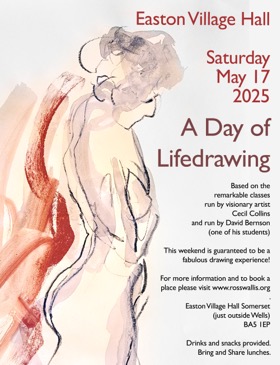
David is an artist and teacher who was taught many years ago by visionary artist Cecil Collins, and it is his inspiration that lives on in David's Teaching. Using pencils, brushes, reed pens and quills, charcoal and sanguine, with very quick poses and working with materials in both hands at once, David entices his students into producing the most spontaneous and remarkable drawings.
Over the course of the we drawers will do something over 100 drawings.
David has developed and extended the methodology to create a unique and effective structure through which students explore the process of drawing.
Aim
The aim of the class is to break down our inherent drawing patterns, to lead us to a fresh understanding of the relationship between the materials, the act of drawing and the subject being drawn, to remove conscious thought from the drawing process and thus allow a direct response from eye to hand. The method that David uses to create this direct connection with the process can be likened to techniques for guided meditation and draw inspiration from a belief in a spiritual dimension to art and its creation.
Method
Each drawing is very quick, with poses rarely lasting more than five minutes. All the drawings are done with both hands simultaneously and the materials used are loose and fluid; sanguine, charcoal, and three tones of Chinese ink as well as pencil. Initially pencils are used for the drawings, but once drawers have become attuned to the drawing session, more direct tools are introduced; bamboo reed pens, quills, Chinese brushes, and the fingers of each hand. David guides each drawing, telling us not only which implements to be using in which hand, but also how the implement should be held; by the very tip, like a sword, or like a dagger, using the very tip of the brush, or the toe or heel of the brush. David will also dictate the tone of ink to be used, and in using the fingers, which fingers should be used in which hand with which tone.
Outcome
Directing the drawing in this very structured way has an opposite effect to that that might be expected – allowing the drawing to become free and unselfconscious.
David will also engender a respect for the materials, the process, the model, and the self, and takes this process a step further by introducing a spiritual dimension and a ‘freedom’ to the drawing process, breaking down further barriers. We might be asked to draw holding the implement in the teeth, or between the toes, to produce a drawing in one minuet, thirty seconds, one second. We may be asked to stop drawing and take up the position of the model to see how a pose ‘feels’. Through this process students are encouraged to let go of preconceptions, self consciousness, and even a little dignity. The result is a fresh and direct response and a real depth of concentration.
David's students lose themselves in the process. The speed at which the time goes by is always a surprise. Two hours of concentrated drawing can pass and feel like a no time at all. To experience this shift in consciousness is in itself a lesson. An essential aspect of drawing but hard to attain, the method that David employs is powerful and successful in creating this depth of concentration.
Drawers are shown the possibility of becoming attuned to the process of drawing and will hopefully take this away with them along with the stack of drawings that they create over the weekend.
